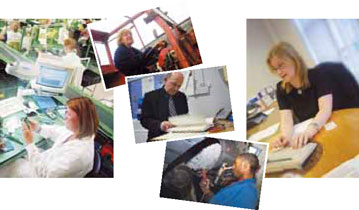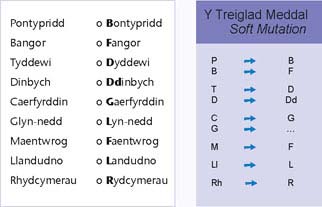3 Sesiwn 3
In this session you will learn how to ask for and give basic information.
Ymarfer 14
Read the following exchanges, then listen to the audio clip and repeat what you hear.
| Beth yw'ch enw chi? | What's your name? |
| Huw dw i. | I'm Huw. |
| Gareth dych chi? | Are you Gareth? |
| Beth yw'ch rhif ffôn chi? | What's your phone number? |
Transcript: Audio 17
Ymarfer 15
Listen to the audio clip below. Make a note of the places and telephone numbers you hear, then play the clip again and give the information in Welsh.
Transcript: Audio 18
| Lle | Rhif | |
|---|---|---|
| Enghraifft | Caerdydd | 567 900 |
| Rhif ffôn 1 | ||
| Rhif ffôn 2 | ||
| Rhif ffôn 3 |
Answer
The answers for this activity are recorded in the audio clip.
Ymarfer 16
Listen to the phrases in the audio clip and repeat them after the sound.
Transcript: Audio 19
| Ble dych chi'n byw? | Where do you live? |
| Dw i'n byw yn Aberystwyth. | I live in Aberystwyth. |
| Dych chi'n byw yn Aberystwyth? | Do you live in Aberystwyth? |
| Ydw, dw i'n byw yn Aberystwyth. | Yes, I live in Aberystwyth. |
| Nac ydw, dw i ddim yn byw yn Aberystwyth. | No, I don't live in Aberystwyth. |
| O ble dych chi'n dod yn wreiddiol? | Where do you come from originally? |
| Beth dych chi'n wneud? | What do you do? |
| Ble dych chi'n gweithio? | Where do you work? |
| If you live near a town rather than in it, you may need to use ar bwys: | |
| Dw i'n byw ar bwys Llanbed. | I live near Lampeter. |
Ymarfer 17
Now learn the phrases in Ymarfer 16 and test yourself using the audio clip. Try to ask the questions without looking at the text.
Transcript: Audio 20
Fill in the gaps in the responses to the questions below.
Dych chi'n byw yn Llanelli?
a) ___, dw i'n byw yn Llanelli.
b) Nac ydw, ___ yn byw yn Llanelli.
c) ___, dw i'n byw yn Abertawe.
Dych chi'n byw ar bwys Wrecsam?
(ch) ___, dw i ddim yn byw ar bwys Wrecsam.
(d) Ydw, ___ ar bwys Wrecsam.
(dd) Nac ydw, ___ ar bwys Rhuthun.
If you were asked O ble dych chi'n dod yn wreiddiol? (Where do you come from originally?) you might answer:
| Dw i'n dod o Bontypridd. | I come from Pontypridd. |
| Dw i'n dod o Loegr. | I come from England. |
| Dw i'n dod o Gwmbrân. | I come from Cwmbrân. |
What do you notice about the Welsh place-names Pontypridd, Lloegr and Cwmbrân in these sentences?
Answer
Here are the complete sentences:
Dych chi'n byw yn Llanelli?
a) Ydw, dw i'n byw yn Llanelli.
b) Nac ydw, dw i ddim yn byw yn Llanelli.
c) Nac ydw, dw i'n byw yn Abertawe.
Dych chi'n byw ar bwys Wrecsam?
(ch) Nac ydw, dw i ddim yn byw ar bwys Wrecsam.
(d) Ydw, dw i'n byw ar bwys Wrecsam.
(dd) Nac ydw, dw i'n byw ar bwys Rhuthun.
You will have noticed that the initial consonant of the Welsh place-names Pontypridd, Lloegr and Cwmbrân have been ‘softened’ to Bontypridd, Loegr and Gwmbrân. This is a regular change in Welsh known as the soft mutation, which is explained in the grammar section at the end of Session 3.
Ymarfer 18
Listen to the audio clip where you are asked to say where you live and where you come from originally. You will be prompted to use the places given in the grid below, and then to give your real details.
Transcript: Audio 21
| You live in | You come from | |
|---|---|---|
| 1 | Llangollen | Aberystwyth |
| 2 | Y Rhyl | Pontypridd |
| 3 | Aberaeron | England |
| 4 | Ynys Môn (Anglesey) | Cwmbrân |
Ymarfer 19
If you were asked Beth dych chi'n wneud? (What do you do?) you might use one of the following answers.

| Athro dw i. | I'm a teacher. (male) |
| Athrawes dw i. | I'm a teacher. (female) |
| Gŵr tŷ dw i/Gwraig tŷ dw i. | I'm a house husband/I'm a housewife. |
| Dw i wedi ymddeol. | I'm retired. |
| Dw i'n ddi-waith. | I'm unemployed. |
| Dw i'n gweithio mewn siop. | I work in a shop. |
| Dw i'n gweithio yn y banc. | I work in the bank. |
Now listen to the audio clip and repeat what you hear.
Transcript: Audio 22
Ymarfer pellach
Practise saying these extra phrases:
| Mecanic dw i. | I'm a mechanic. |
| Dw i'n gweithio yn Tesco. | I work in Tesco. |
| Dw i'n gweithio fel actor. | I work as an actor. |
| Dw i'n gweithio i M&S. | I work for M&S. |
Ymarfer 20
Listen to the dialogue in the audio clip. How do the speakers answer these questions in Welsh?
Transcript: Audio 23
| Geraint | Ffion | |
|---|---|---|
| Sut dych chi? | ||
| Ble dych chi'n byw? | ||
| Beth dych chi'n wneud? |
Try to pick up the second thing which Geraint says he does – it's a useful thing to know how to say.
Answer
Here is the completed grid:
| Geraint | Ffion | |
|---|---|---|
| Sut dych chi? | Da iawn | |
| Ble dych chi'n byw? | Yn Llanelli | |
| Beth dych chi'n wneud? | Dw i wedi ymddeol. | Dw i'n gweithio yn y banc. |
Geraint added ‘…a dw i'n dysgu Cymraeg’ (‘… and I'm learning Welsh’).
Ymarfer 21
Finally, use the audio clip to practise giving your own personal answers to the questions you have learned. If necessary, go back over some of the activities until you feel confident in using the language you have learned in this session.
Transcript: Audio 24
Geirfa
Nouns in Welsh are either masculine or feminine. Sometimes the gender of a word will be obvious from the meaning (e.g. athro, athrawes), but for others (e.g. siop, swyddfa) you need to learn the gender when you learn the word. In the Geirfa sections of Croeso you can assume that nouns are masculine – gwrywaidd – unless they are marked (b) – benywaidd (feminine). Look at your own Welsh dictionary now to check how it indicates the gender of nouns. It will be made clear later on why you need to know a noun's gender.
| actor | actor | byw | to live |
| actores (b) | actress, female | di-waith | unemployed |
| actor | dod | to come | |
| ar bwys | near | enw | name |
| ar hyn o bryd | at the moment | gŵr tŷ | house husband |
| athrawes (b) | teacher (female) | gwraig tŷ(b) | housewife |
| athro | teacher (male) | gweithio | to work |
| banc | bank | mewn | in a |
| nawr | now | wedi ymddeol | retired |
| o (+ TM) | from (+ soft mutation) | yn | in + the/in + specific place |
| rhif ffôn | phone number | yn wreiddiol | originally |
| siop (b) | shop | ysbyty | hospital |
| swyddfa (b) | office | ysgol (b) | school |
Write down some vocabulary words that are relevant to you.
Gramadeg
a/an
Notice that there is no indefinite article (a/an) in Welsh:
| athro | a teacher |
| siop | a shop |
Mewn or yn?
Use mewn when it means ‘in a’:
in a hospital = mewn ysbyty
in a factory = mewn ffatri
Use yn when you refer to somewhere specific:
in the house = yn y tŷ
in Glangwili hospital = yn Ysbyty Glangwili
in the Sony factory = yn ffatri Sony
Mutations – Treigladau
Some consonants at the beginning of words undergo regular changes when in certain positions. The most common of these changes is known as the soft mutation (y treiglad meddal), which affects the initial letters listed in the table on the right. One place where this change occurs is after the word ‘from’. You will still be understood if you forget to use the mutated form, but, particularly when you need to find words in a dictionary, you need to be aware of the changes.

